8 Worst Cars to Buy Used, Experts Say

If you’re in the market for a car, there’s a good chance you’re looking into used options as a way to save money. But as with any big financial decision, there are a few things to consider—and that’s especially important when it comes to buying a car, where the wrong choice could land you with a lemon. Thankfully, car experts have some important insights that can help you avoid this outcome. Read on to discover their picks for the eight worst cars to buy used.
RELATED: Expert Names 5 Cars That Won’t Last 60,000 Miles.
1
Fiat Chrysler Automobiles
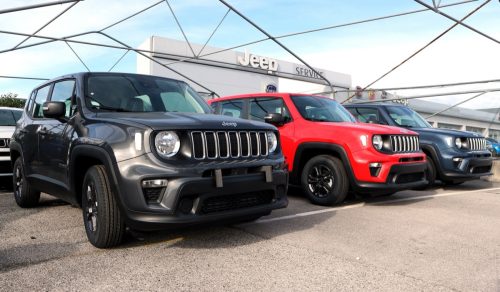
First up on the list of used vehicles to avoid are those under the Fiat Chrysler Automobiles (FCA) umbrella, namely Chrysler, Dodge, Jeep, and Fiat models.
“While not all Chrysler-made vehicles are bad, we’ve come to experience that their sub-compact, compact, and smaller SUVs are not very reliable and come riddled with issues,” Mark Beneke, co-owner of Westland Auto, Inc., tells Best Life. “Chrysler has a tendency to place a lot of focus on their bigger truck/SUV and performance lineups, which makes those options great. However, they invest heavily in the cosmetics/entertainment components of the rest of their vehicles and seem to neglect the quality of their mechanical build.”
Beneke also notes that Chyrsler “responds slowly to fixing common issues” when they emerge. He cites engine issues with the Chrysler PT Cruiser, transmission issues with the Dodge Journey, and problems with the 2.6 V6 motor that’s used in several vehicles.
Last year, Seth Godwin, a TikToker (@seth.godwin) who provides finance and car advice, specifically highlighted the 2014 through 2017 Jeep Renegades as some of the worst used cars to buy.
“The Renegade is the first vehicle Jeep produced after Fiat took over Chrysler, and it shows in practically every way possible,” Godwin says in the Jan. 2023 video. “In typical Fiat fashion, these had the trifecta of issues you don’t want any car to have: engine issues, transmission issues, and electrical issues. How nice.”
2
Certain sports cars
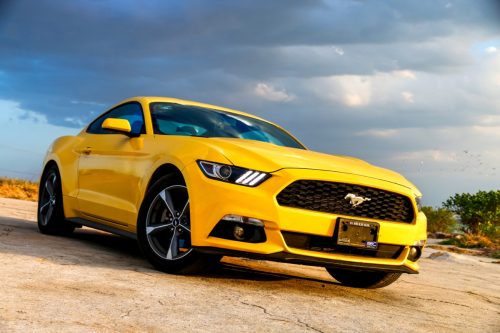
Owning a sports car is a dream for many, and to avoid the hefty price tag, some buyers opt to get them used. However, according to JustAnswer Auto Expert Chris Pyle, you may want to avoid common models like the Ford Mustang, Chevy Camaro, and Dodge Charger.
Luxury sports cars made by Porsche and Lamborghini are also a bit risky, as they’re either “kept in top shape to remain beautiful” or “treated like race cars their entire life and ran like a dog at every red light,” Pyle cautions.
RELATED: Mechanics Reveal 5 Cars That Are “Not Gonna Make It to 100,000 Miles.”
3
Specific trucks
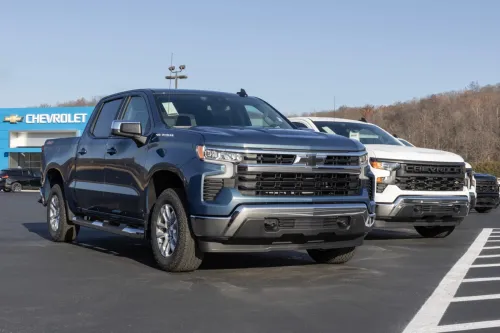
Pyle says that certain used trucks are also better left at the used car lot. He recommends staying away from the Ford Super Duty, the Dodge/Ram Heavy Duty, the Chevy Silverado, the Ford F-150, and Dodge trucks.
“All too often trucks are abused or altered. People use them to tow more than they should, or they ask too much of the truck and tow 20,000 pounds up a mountain trying to pass every car in the fast lane,” Pyle explains. “Many [owners] alter them by removing emissions stuff or they use programmers to get more power out of the engine. These things prematurely wear [down] the engine and transmission.”
And because these trucks are expensive when bought new, the previous owner may not have been able to keep up with maintenance either, Pyle warns. If you do want one of these trucks, “make sure you are getting a truck that has been treated right,” he concludes.
4
Models with early versions of CVT
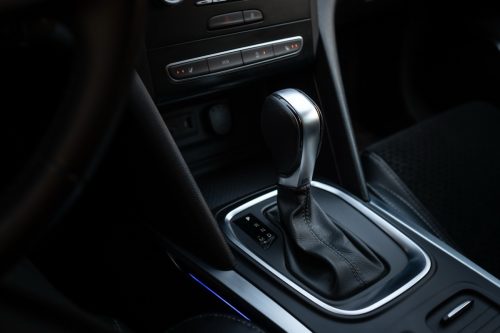
Experts also advise against vehicles that were equipped with continuously variable transmission (CVT) on the earlier side.
“The transmission known as CVT has become the new norm and most vehicles come equipped with them nowadays. However, early vehicles, especially the Nissan lineups, were riddled with problems that guaranteed a replacement on most of them after roughly 80,000 miles,” Beneke explains.
He continues, “If you account for this in your budget prior to you proceeding with them, they can be great cars, but if not, it’ll be a costly surprise.”
RELATED: 10 Most Expensive Cars to Maintain, New Data Shows.
5
Luxury brands
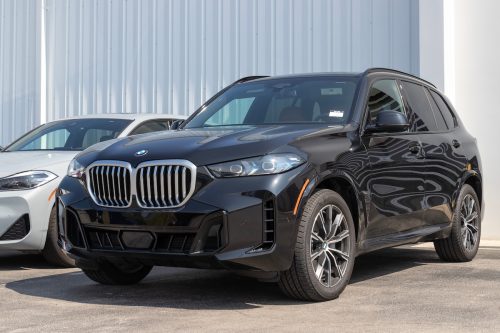
Similar to sports cars, you can get luxury vehicles significantly cheaper when you buy them pre-owned. Even with those savings, however, it might not be the best move.
“Luxury brands can be great, but they [need] to be upgraded frequently, which makes them a bad used car to buy,” Beneke says. “They have high maintenance costs, wear down very quickly past certain mileage/years, and depreciate at an extremely rapid pace.”
When buying used, Mercedes-Benz, BMW, Audi, Cadillac, and Volvo vehicles should all be avoided, per Beneke’s recommendation.
6
Early electric vehicles
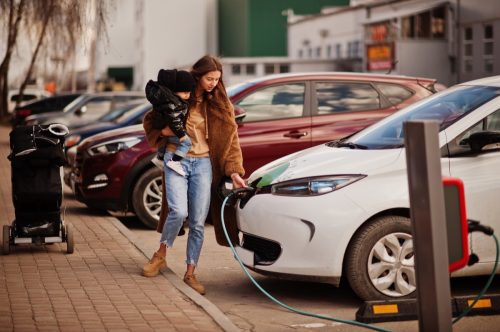
Buying a used electric car might seem like a money-saver in more ways than one, since you’d be able to cut down on fuel costs. But Beneke advises caution.
“If you’re dead-set on getting an electric vehicle, don’t buy [older used models],” he says. “The early electric models like the Nissan Leafs had batteries that would begin losing charge extremely quickly and reduce the driving range to nearly useless.”
Beneke says to avoid the Nissan Leaf, the Ford Focus Electric, the Honda Fit EV, the Chevrolet Spark EV, and the Fiat 500e.
RELATED: 5 Popular Cars That “Will Bankrupt You,” Expert Says.
7
Vehicles that weren’t treated well
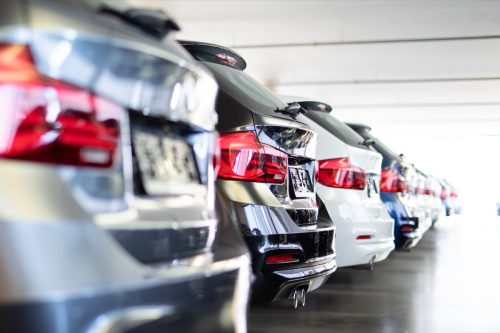
You’ll also want to avoid buying a used vehicle that hasn’t been maintained, experts say. This can be tricky as the car might look OK from the outside but really have hidden mechanical issues.
“Proper maintenance on a used car can make it last a very long time. Without that maintenance, it may be prone to breaking down or expensive repairs,” Brian Moody, executive editor at Kelley Blue Book, tells Best Life.
Oftentimes these cars will be labeled as “branded” or “salvaged” if they’ve experienced damage like a flood or fire, Moody says.
8
Rental cars
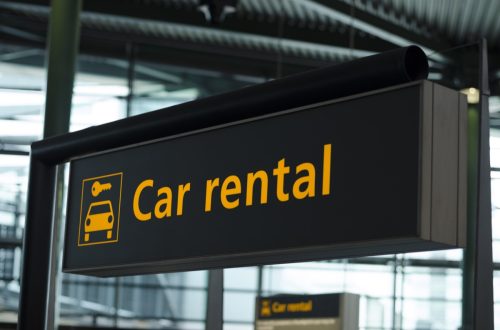
A car that was once a rental—meaning one that was used by multiple drivers over several years—isn’t your best bet either.
“I recommend staying away from rental cars, as they do not have the best life, and do some research to see if the used car at a dealer came from an auction, because that is where most rentals end up,” Pyle shares.
Why is it worth it to buy used?
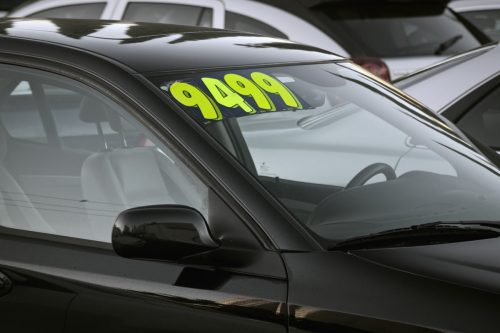
While there are some makes and models you want to steer clear of when buying pre-owned, there are several benefits to used cars in general.
Above all, there’s the savings aspect, particularly when it comes to depreciation.
“Five to 10-year-old used cars have already undergone the bulk of their depreciation which means they won’t lose as much value just from the time when you buy them as compared to new,” Beneke explains. “They are also much more affordable than their new counterparts and because of that, it translates to reduced insurance premiums, taxes, and registration fees.”
Beyond that, there’s also the fact that used cars have a longer “track record.”
“While many people believe that new vehicles come completely defect-free, this is far from the case. It’s the reason why recalls and warranty extensions occur,” Beneke notes. “As a new model hits the market, there are kinks that need to be worked out and common issues that start appearing that you will never be able to see until the vehicle has had enough time on the road.”
When you buy used, you have extra time to determine which vehicles might perform better or be more prone to problems. As a result, you’ll feel more secure in your purchase, Beneke says.
RELATED: Mechanic Shares How Hyundai and Kia Engines Always Fail.
What’s the difference between buying used and buying certified pre-owned?
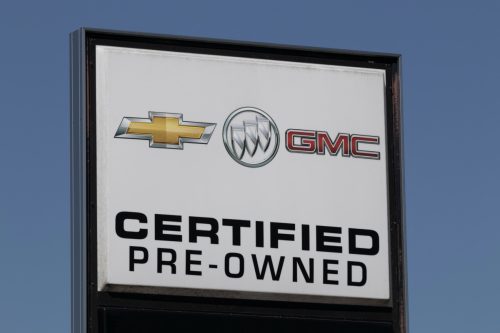
There’s buying used and buying new, but there’s also another car-buying category: certified pre-owned (CPO).
Put simply, a CPO used car went through manufacturer inspections and meets certain criteria. Any issues are fixed by their technicians to comply with certain standards and there’s a manufacturer-backed warranty, Beneke and Moody explain.
“Whether one is preferable to the other comes down to preference,” Beneke says. “CPO used cars provide you with an added layer of peace of mind as it has already undergone many tests and repairs prior to you purchasing it. However, you have to understand that it in no way guarantees the vehicle will be defect-free.”
You might pay a little more for that added layer of security, so you’ll want to weigh your options.
“If you value cost savings and like to maintain vehicles yourself, buying used will be the better option as you’ll have more vehicles available, more room for negotiation, and can get it at a much more affordable price tag,” Beneke shares. “If you value peace of mind, then CPO would be the better route, as someone else has reviewed it for you and a lot of the time [the car] can come equipped with an extended warranty.”
Best Life offers the most up-to-date financial information from top experts and the latest news and research, but our content is not meant to be a substitute for professional guidance. When it comes to the money you’re spending, saving, or investing, always consult your financial advisor directly.